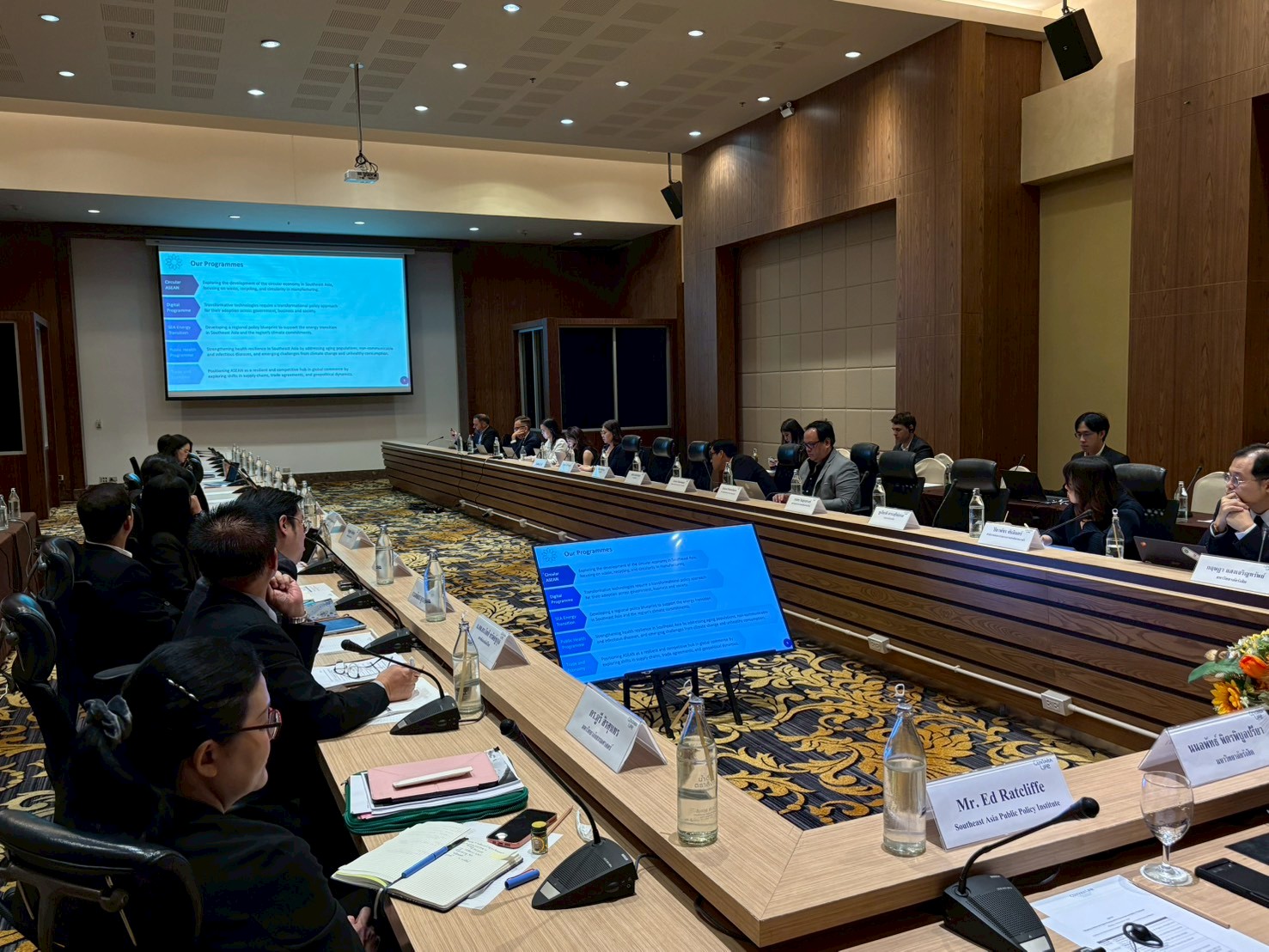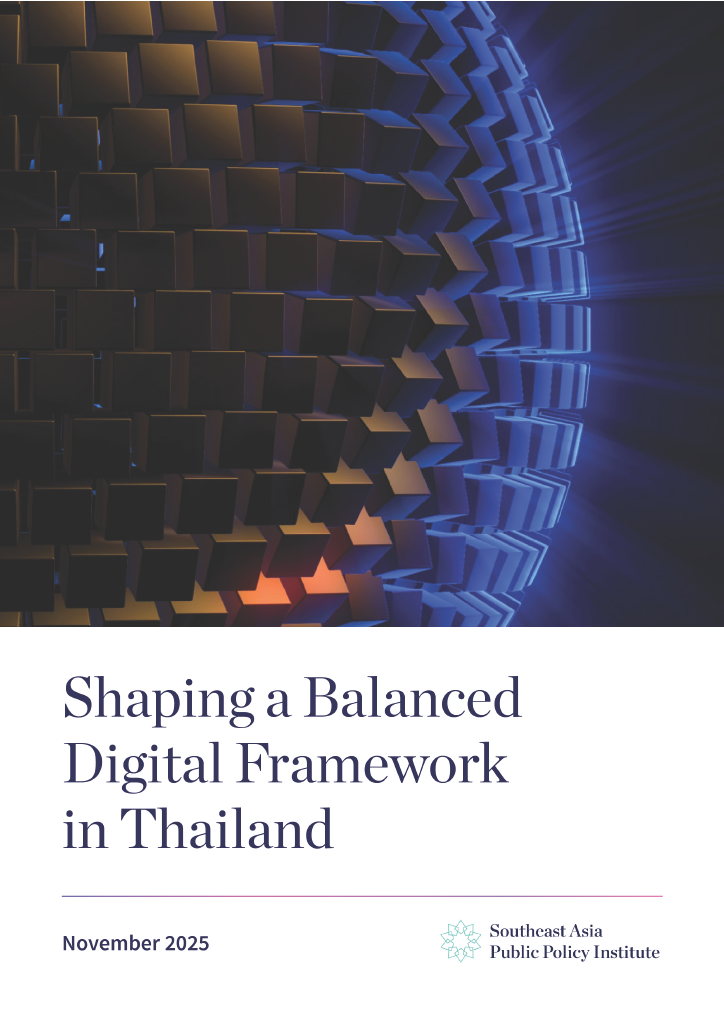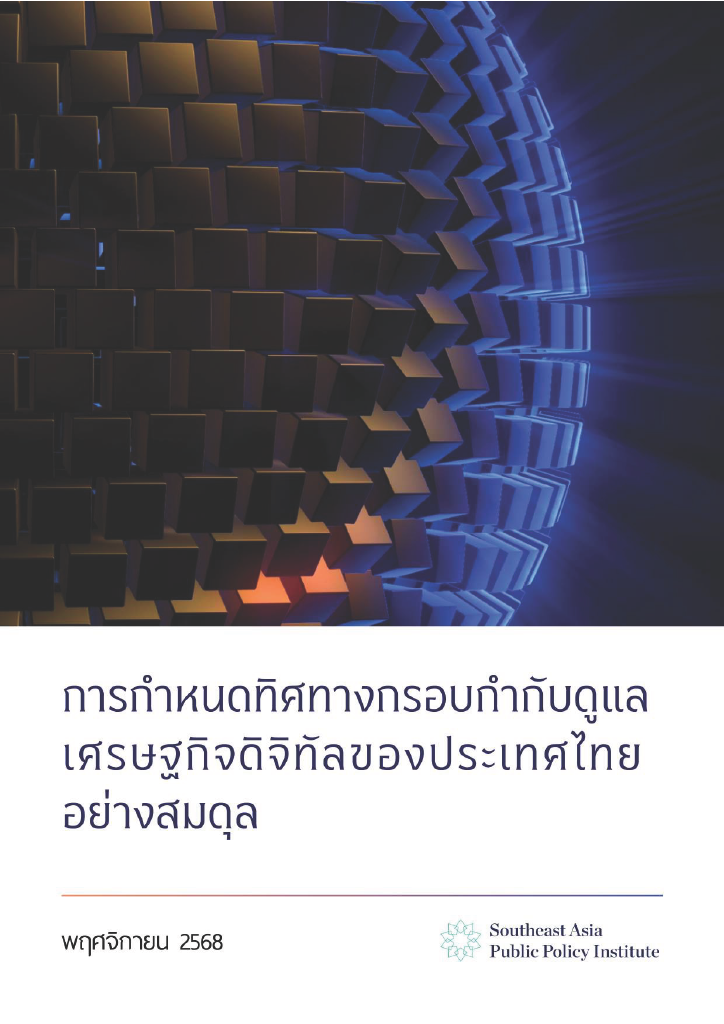New white paper on Balanced Digital Framework in Thailand launched at high-level roundtable

Bangkok, Thailand – November 2025 – The Southeast Asia Public Policy Institute (SEAPPI) today released its latest policy white paper, Shaping a Balanced Digital Framework in Thailand, at a high-level roundtable co-hosted with Rangsit University. The report examines how Thailand can sustain digital-economy momentum while developing fair, transparent, and innovation-friendly regulation.
Thailand’s digital economy has become a major engine of productivity and inclusion, expanding from around six percent of GDP in 2023 (US $36 billion) to a projected eleven percent by 2027. SMEs are at the core of this growth: over 92 percent of Thai consumers shop online, and small businesses rely heavily on digital platforms to access ASEAN’s US $230 billion online market.
However, the next phase of regulatory development will be decisive. Emerging instruments—including the Trade Competition Commission’s (TCCT) Draft Guidelines on Multi-Sided Platforms, the proposed Platform Economy Act (PEA), and the Royal Decree on Digital Platform Services (2022)—mark a shift from light-touch oversight toward prescriptive, ex-ante regulation. Without careful consultation and impact assessment, these overlapping initiatives could increase compliance burdens and uncertainty for both large and small operators, slowing innovation and investment.
The roundtable brought together academics from Rangsit University and Thammasat University, alongside representatives from key government and industry bodies, including the Trade Competition Commission of Thailand (TCCT), Department of Business Development (DBD), Department of Internal Trade (DIT), Office of SMEs Promotion (OSMEP), Thai Game Software Industry Association, Foundation for Consumers, Thailand Consumers Council, and the Thai Digital Platform Trade Association. Their insights and reflections on Thailand’s evolving digital economy helped enrich the discussion at the launch and underscored the relevance of the issues examined in the paper.
SEAPPI’s comparative analysis draws lessons from the EU’s Digital Markets Act (DMA) and Digital Services Act (DSA) as well as newer approaches in the UK, Singapore, Japan, and Korea. It finds that the DMA’s complex compliance obligations—costing €100–400 million per firm—have strained even advanced economies. Flexible, evidence-based frameworks such as the UK’s market-investigation model and Singapore’s consultative digital-competition approach demonstrate more proportionate alternatives that sustain innovation and investor confidence.
Quantitative modelling by SEAPPI estimates that a broad-scope application of Thailand’s draft platform rules could generate aggregate compliance costs of THB 10–24 billion (≈ 0.04 percent of GDP), with downstream SME impacts of THB 5–12 billion (≈ 0.15–0.3 percent of SME online GMV). Such costs could cascade through supply chains, raising SME operating expenses and narrowing margins, particularly in Thailand’s price-sensitive digital sectors. Over the long term, under the proposed platform regulation, reduced investment in digital infrastructure and innovation could potentially stifle productivity and reduce Thailand’s digital economy output by a cumulative THB 150–200 billion by 2030.
“Thailand’s digital economy is strong because it has been open, competitive, and entrepreneur-led. That is a strategic advantage,” said Ed Ratcliffe, Executive Director of SEAPPI. “The decisions made now will determine whether Thailand continues to lead or risks slowing the growth and accessibility of its digital markets. The key is to develop an effects-based and innovation-friendly regulation—rules that strengthen trust and transparency without constraining the ability of Thai businesses to innovate, invest, and compete.”
The white paper calls for a transparency-based, effects-driven framework focused on demonstrable harms rather than broad ex-ante mandates. Its key recommendations include:
- Adopt evidence-based, consultative rulemaking: requiring full regulatory impact assessments and structured dialogue with industry, SMEs, and civil society before new obligations are introduced.
- Enhance industry engagement and capacity building: establish regular public–private dialogue and provide guidance to help SMEs understand and meet new regulatory requirements.
- Strengthen institutional coordination: clarify institutional roles to avoid overlap, ensure consistent enforcement, and build investor confidence.
A balanced, predictable, and consultation-led framework will help Thailand safeguard innovation, attract sustainable digital investment, and serve as a model for smart platform regulation across ASEAN.
Download the full report here.
รายงานภาษาไทย คลิกที่นี่
This paper has been researched and produced by the Southeast Asia Public Policy Institute with support from Amazon. The information and analysis presented are based on interviews with relevant stakeholders, publicly available information, and analysis by the authors. It does not represent the views of Amazon. It is not intended to be an exhaustive review of policy, legislation, or regulation and should be used with due caution and consideration of its scope and limitations.
About the Southeast Asia Public Policy Institute
The Southeast Asia Public Policy Institute is a research institute based in Bangkok and Singapore, working across the region. Our mission is to support the development of solutions to the most pressing public policy challenges facing Southeast Asia in the 21st century. The Institute undertakes in-depth research to develop actionable policy solutions on a range of issues across sustainability, technology, public health, trade, and governance. We convene dialogues with stakeholders and decisionmakers to drive discussion on the challenges and opportunities facing markets across the region. The Institute draws on a network of in-market researchers, advisors, and partners to provide insights and recommendations for governments, policymakers, and businesses.
News and insights

Southeast Asia Global Relations Outlook Part 2: India, BRICS, and GCC

Southeast Asia Global Relations Outlook Part 2: The EU, Japan, and South Korea


